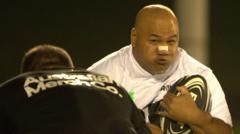The Run It Championship League, a risky collision game gaining global traction, is caught in a storm of excitement and criticism as safety issues arise.
**Collision and Controversy: The Rise of Run It Championship League**

**Collision and Controversy: The Rise of Run It Championship League**
Innovative collision sport faces scrutiny amid soaring popularity and safety concerns.
In what many are dubbing the "world's fiercest new collision sport," athletes are clashing without protective gear at the Run It Championship League. Originating in the Pacific Islander communities of Australia and New Zealand, the game tests participants' strength and skill as they charge at each other while trying to dominate the contact. Recently, this backyard game has enjoyed a surge in popularity, generating millions of views online, securing sponsorships, and even inspiring rival leagues.
The league's vibrant atmosphere was on full display during events held in Melbourne and Auckland, with the stage now set for a high-stakes tournament in Dubai, where a cash prize of A$200,000 awaits the victor. However, despite the thrilling spectacle, medical professionals express serious concerns over the risks associated with this contact sport, citing injuries and one tragic death linked to imitative gameplay among untrained individuals.
Co-founders Brandon Taua'a and Stephen Hancock have fond memories of the street versions of the game but emphasize that the league incorporates safety protocols, including thorough medical screenings and an emergency medical team present at events. Yet, the sport's growing notoriety and social media presence raises alarms among safety advocates, arguing that it normalizes dangerous behavior and poses risks of serious injury or concussions.
As champions vie for remarkable cash prizes, they also highlight economic struggles and the transformative potential of winnings for competitors. For some, like recent Auckland winner Champ Betham, the opportunity to earn significant sums quickly provides necessary support for families during financial hardships.
However, the excitement is overshadowed by concerns from experts who argue that the league could contribute to a culture of toxic masculinity and desensitize youths to violence. With warnings from healthcare professionals and regulatory bodies, the league's founders defend their model, asserting that it promotes skill rather than recklessness and stands in comparison with established sports like rugby.
The potential for further growth in markets such as the UK and US remains, but voices of dissent caution against glamorizing a sport that some deem dangerous. As the inaugural Dubai finale approaches, both proponents and critics are eagerly awaiting its outcome, questioning whether this phenomenon will solidify as a recognized sport or become a fleeting trend in the realm of extreme sports.
The league's vibrant atmosphere was on full display during events held in Melbourne and Auckland, with the stage now set for a high-stakes tournament in Dubai, where a cash prize of A$200,000 awaits the victor. However, despite the thrilling spectacle, medical professionals express serious concerns over the risks associated with this contact sport, citing injuries and one tragic death linked to imitative gameplay among untrained individuals.
Co-founders Brandon Taua'a and Stephen Hancock have fond memories of the street versions of the game but emphasize that the league incorporates safety protocols, including thorough medical screenings and an emergency medical team present at events. Yet, the sport's growing notoriety and social media presence raises alarms among safety advocates, arguing that it normalizes dangerous behavior and poses risks of serious injury or concussions.
As champions vie for remarkable cash prizes, they also highlight economic struggles and the transformative potential of winnings for competitors. For some, like recent Auckland winner Champ Betham, the opportunity to earn significant sums quickly provides necessary support for families during financial hardships.
However, the excitement is overshadowed by concerns from experts who argue that the league could contribute to a culture of toxic masculinity and desensitize youths to violence. With warnings from healthcare professionals and regulatory bodies, the league's founders defend their model, asserting that it promotes skill rather than recklessness and stands in comparison with established sports like rugby.
The potential for further growth in markets such as the UK and US remains, but voices of dissent caution against glamorizing a sport that some deem dangerous. As the inaugural Dubai finale approaches, both proponents and critics are eagerly awaiting its outcome, questioning whether this phenomenon will solidify as a recognized sport or become a fleeting trend in the realm of extreme sports.





















